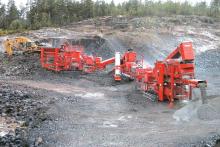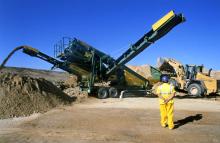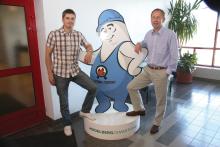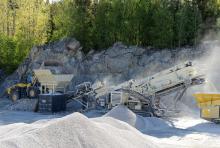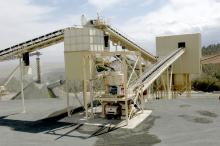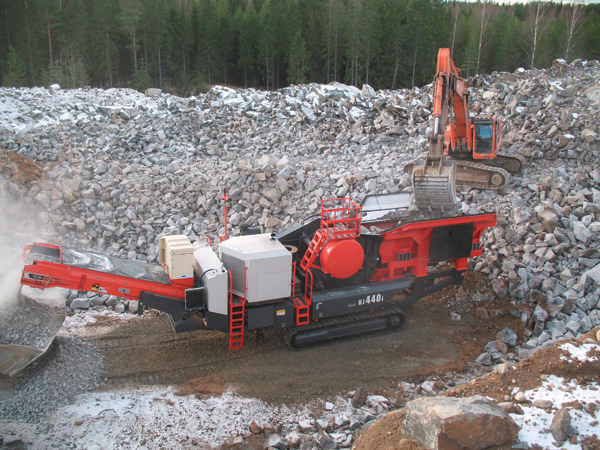
Finland has one of the highest aggregate consumption rates per capita anywhere in the world. Heikki Hari takes a look at this unusual market
Being a small country - with a population of 5.3 million - Finland does not feature in the extremes of aggregate production. There is one exception though - because the country is relatively large compared to its population, the annual consumption of aggregates per person is 20tonnes, which is one of the highest figures in the world.
Finland features a large number of eskers - long ridges of glacial sand deposits - and thin topsoil on the bedrock, which is mainly granite, making it provide predominantly a hard rock country. But because the eskers provide both natural beauty and excellent natural drinking water reservoirs, the access to these gravel resources is limited and well over half of Finland's aggregates are produced from crushed and screened hard rock.
Recent years have shown a steady increase in demand, but although a slight downturn is expected this year the market is still bouyant. "In Finland we are still well off, particularly if we compare today's situation to the deep recession 15 years ago. In 1993, only 200 new pieces of construction equipment were purchased in Finland, but last year the figure was approximately 2,400 units," explained Martti Kärkkäinen who heads the aggregates sector of Infra, the Finnish central organisation of the infrastructure industries.
The volume of aggregates produced in the country totalled 105million tonnes last year, which was approximately 5% more than in 2006.
The industry in Finland is very fragmented - there are only two companies that produce more than 15million tonnes annually. One is
There are also only a few stationary quarries. Most of Finland's aggregates are produced from small deposits using mobile track-mounted contract crushing and screening equipment. Consequently, the average annual production is only 30,000tonnes per company and the number of gravel and hard rock pits and quarries is about 3,500.
"We should gradually decrease the number of operations and open larger quarries located near major cities and towns and other places that use the quarried material. The present system is not efficient enough," said Kärkkäinen.
Recycling is not a viable solution in Finland since the amount of recyclable materials continues to be insignificant. Transportation causes the biggest impact on environment from the aggregates sector.
Major projects
The total value of all infrastructure projects annually is approximately €5billion and this fund is alloted to streets (18 %), roads and highways (17 %) and railways (9 %) as well as other projects. The total allocated to railways is increasing to fund help finance expansion of the network.
The biggest ever construction project in Finland is the Olkiluoto 3 nuclear power plant on the southwest coast. It requires a lot of high quality aggregates for concrete and other purposes. In the north of the country, there are several new mines being opened, under construction, or under feasibility study stage. This has considerably increased the demand for all types of aggregates in those areas as facilities to operate the mines are built.
There are also quite a few highway projects in progress, most notably in the Tampere area and in the southeast. Due to continuous migration from the north of the country to the cities and towns in the south, communities there need to increase road capacity to cope with the additional traffic; other infrastructure projects are also being driven by this migration.
Challenges
The Finnish aggregate producers face the same challenges as their colleagues in most developed countries in Europe - a lack of skilled workers, the not-in-my-backyard attitude, and access to resources in financially viable areas.
In Finland there is an additional complication called the 'double permission' procedure. It means that people are allowed to appeal twice to the high court if they wish to resist the opening of a green field pit or quarry site. This naturally complicates the producers' operations and affects their ability to plan ahead. However, discussions have started with authorities on the idea of establishing a 'one stop shop' for quarry permissions.
It is estimated that the aggregates sector in Finland employs around 3,000 people and the number is slightly decreasing each year. Not because there are not enough jobs, but a lack of suitable qualified people to fill those that do exist. However, measures have been taken to overcome the problem - one way that is being used to tackle the issue is to hire people from other countries, particularly from Estonia and Poland.
Fully occupied
Fjäder Group is one of the bigger aggregate producers in Finland. It produces annually between 2 and 2.5million tonnes of various types of end products. Last year the company's sales amounted to €17.5million with a workforce of 90 people. The company is active in the southern and western regions of the country.
"The last few years, and this year too so far, have been extremely busy for us. Everybody is saying that things might go down but right now there are not yet any signs of it. However, I don't want to make any predictions concerning 2009," said Fjäder Group managing director Per Fjäder.
"Our order book is full up to the end of this year. Last year and up to June this year our biggest project has been the Vuosaari port project in Finland's capital Helsinki. Our contract there includes the processing of approximately 2million tonnes of aggregates for the asphalt works in the port area. Later this year the biggest single operation is a highway project near the Russian border in the southeast. There we will crush approximately 0.5million tonnes of aggregate for construction work on the scheme."
Fjäder Group's crushing equipment is all based on track-mounted units. "We have a fairly new fleet, which we update regularly. However, we have noticed that the delivery times have become longer but hopefully they will not get any worse," added Fjäder.
Positive development
There is optimism on the construction equipment side. "The whole decade has shown very positive figures and high demand, and we see no major risks or problems in the near future either," said
Track-mounted crushing and screening units have been the clear trend in the Finnish industry now for over 20 years and the pattern is expected to continue - the only difference is a move towards larger units.
"The demand for crushed rock is exceeding that of sand and gravel, which explains pretty much the reason for larger units. The only limitation is the transportability on roads and the related regulations," Heikkilä commented. "There are cases when the plants are dismantled and transported in pieces due to need of higher throughput, although basically the idea of mobility is based on plants that can be transported in one piece for efficiency." Another trend in Finland is that track-mounted operations have increasingly started to turn into a three-stage configuration. According to Heikkilä, this is necessary when the rock is more difficult to process or when the operator needs to produce lots of finer end products.
"A modern track-mounted crushing and screening system can produce well over 300tonnes per hour," he said.
Consoldation
There has been a sizeable consolidation among the producers in Finland just like almost everywhere else in the world. The number of big and medium-sized players is approximately 10, and then there is a large number of small operations. "The number of small to medium companies seems to be growing as the gap between the big and small enterprises needs to be filled," said Heikkilä.
He also predicts that the competition between suppliers will increase. "The two traditional suppliers to the Finnish aggregates market were Metso Minerals and
In demand
"The whole aggregate processing industry in Finland has been very busy lately. From the producers' side, the main problem seems to be getting new machines in reasonable time. Naturally the delivery situation varies a lot depending on the type of equipment. In some cases it is only a few weeks but in other cases it may extend over six months," said Lars Lönnqvist, Sandvik's sales manager of crushing and screening equipment in Finland.
He has also witnessed the trend towards larger machines: "The big plants require the same size of workforce as the smaller ones, so the productivity in relation to manpower is better." According to Lönnqvist, there is also another trend emerging that may soon change some of the industry's habits. "For almost 20 years, the contract crushing segment has purchased only track-mounted mobile crushing plants. However, now there are signs of increasing interest to wheel-mounted portable plants. I think the change is coming about because when pits tend to become larger, the producers look forward to more robust plants that stay in one place for a longer period of time and then the track-mounted plants are sometimes too small," he explained.
Sandvik is one of the two major equipment suppliers in Finland. "The operating conditions in our country are very difficult and complex so good customer care is the main success factor in equipment business. This means that an equipment supplier has to train the customers' personnel properly and make sure that both after-sales service and parts supply are well organised," he concludes.

